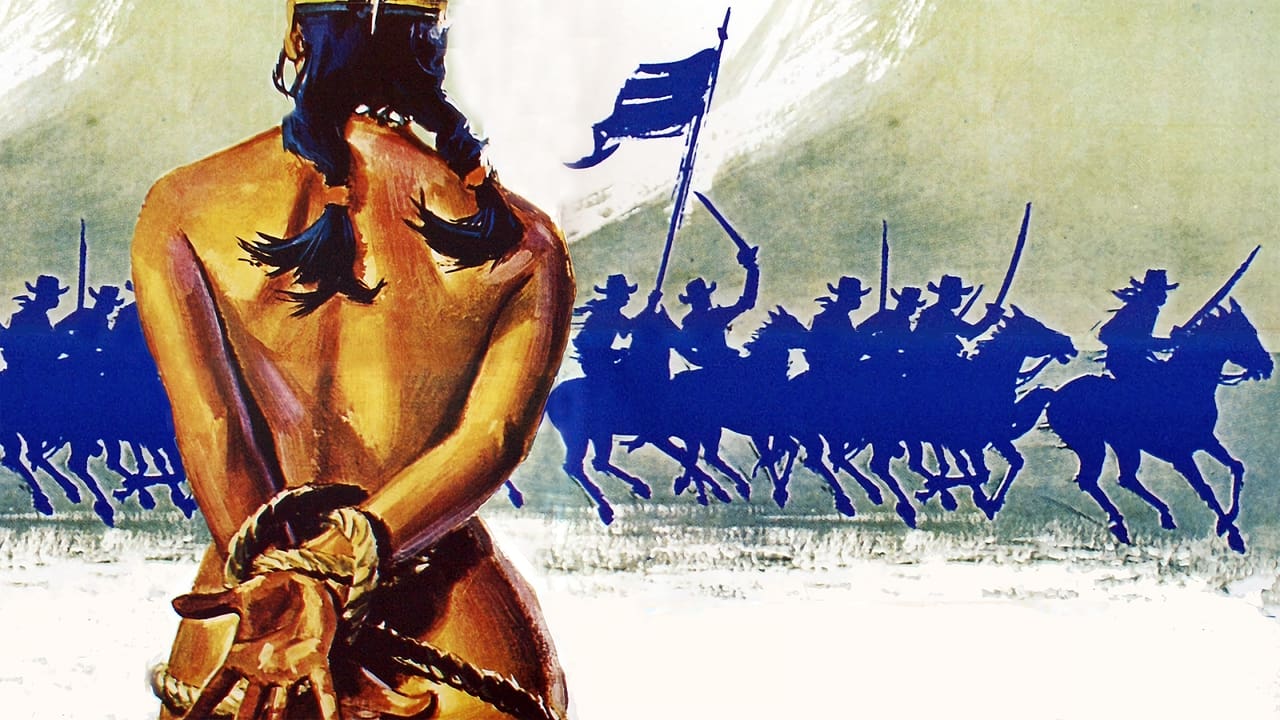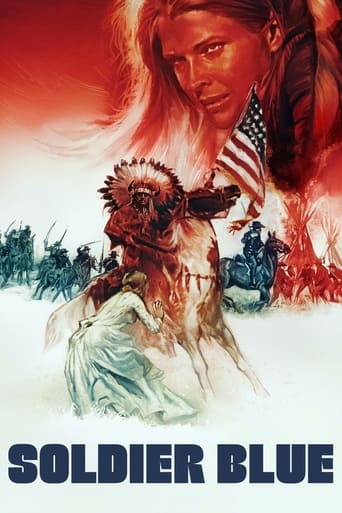



one of my absolute favorites!
A Brilliant Conflict
The movie turns out to be a little better than the average. Starting from a romantic formula often seen in the cinema, it ends in the most predictable (and somewhat bland) way.
View MoreThe movie is wonderful and true, an act of love in all its contradictions and complexity
View MoreA white woman on her way to be married and an army private are the only survivors of a Cheyenne attack on the paymaster's wagon of the U.S. Calvary. She's a Cheyenne sympathizer, having spent two intimate years living with the tribe, and soon learns that Calvary soldiers--including her fiancé--are about to stage a surprise attack on an Indian village. A rocky western, though in many ways a surprisingly standard one, with two protagonists who banter back and forth like a grown-up Tom Sawyer and Becky Thatcher. However, the man-woman dynamics and survival techniques along their episodic journey back to the fort are eventually upstaged by the filmmakers' desire to Make a Statement, one filled with righteous anger. Buffy Sainte-Marie's title song quivers with barely-contained emotion, letting the audience know what it's in for. Screenwriter John Gay, adapting Theodore V. Olsen's book "Arrow in the Sun," is intent on showing history "as it really happened," yet his dialogue covers the basics ("Put into your minds the abominations of these godless barbarians! Murder! Rape! Torture! When you think of your fallen, butchered comrades, ask yourself, 'are we going to give the Cheyenne the same mercy?'"). Gay and director Ralph Nelson want audiences to get riled up, take a stand, raise a fist into the air--and not just on the basis on the much-discussed final massacre on the Natives by the Calvary (Natives, by the way, who were waving a white flag), but on speeches that portend to show what ignorant savages and hypocrites Americans were/are. Their film was probably meant to mirror the Vietnam headlines at the time, but by depicting bloody violence as a means to ending bloody violence, one may find the filmmakers' stance a little shaky (it was produced by sensationalist Joseph E. Levine, after all). Peter Strauss and Candice Bergen aren't a terribly interesting twosome--especially when things turn romantic-- but Bergen doesn't cancel herself out of the trying dramatic circumstances (as she typically did in her early performances). Her heart is in this material--everybody's is, we are to assume--and yet her characterization rings false...and the harder she tries, the worse the results. ** from ****
View MoreSoldier Blue was another Anti US Military/Anti Viet Nam film made in the early 1970's, this time using the nineteenth century American Government's ethnic cleansing policies against the Native American Tribes of the Western Planes as a metaphor for The US Governments Southeast Asian Policy of the Viet Nam Era.The college anti war crowd had "Fallen in Love" with Native American Culture and Hollywood was looking to cash in on their new appreciation of the dark side of the winning of the American West. Soldier Blue is loosely based on the Sandcreek Massacre of 1863.The film purports to chronicle the events leading up the tragic incident as seen through the eyes of two white people. That is the big problem with the film.Other then the title song by Buffy Saint Marie there really isn't a whole lot of input from the Indians The Native Americans portrayed are still caricatures and little is revealed about their personalities and viewpoints other then they are the "Noble Savages" and are in need of the sympathetic guidance of the two racially sensitized Caucasians because they are not really sophisticated enough to understand whats going on.While the theme of the movie is certainly a laudable one, that's not enough.The script tries to be politically correct but comes off as condescending.The opening scene has Dana Elcar coming out of an outhouse which winds up being a telling image of story quality of the film itself It also is way too vague in it's historical reference. It has the Sandcreek tragedy happening in 1877 which is 14 years later then it really happened The two leads Candace Bergen as Cresta "Maribel" Lee and Peter Strauss as Honus Gent give weak performances that sink the story.Bergen was beautiful but had yet to find herself as an actress at that time and she plays her character as so smug and irritating that you hope somebody will shoot her.Strauss is totally forgettable as the whiny and unobservant Gent. Donald Pleasence gives some life to the proceedings with his characterization of Isaac Q Cumber but he is essentially playing the same sneaky, greasy bad guy he played in "Will Penny" and would play again in "Centennial".Possible SpoilerMuch has been made about the graphic attack on the Cheyenne village shown at the conclusion of Soldier Blue. It's extremely well executed...so to speak... and director Ralph Nelson did an outstanding job of visualizing the horror and the reality of the massacre and it's accurately depicted here. If the rest of Soldier Blue had been as well done as this particular episode in the movie, it would have been a classic film. As it is Soldier Blue is much more about the American political mindset of the 1970's then it is about the history of the American West in 1870's
View MoreDon't want to write to much. I cant give this movie lower than 7 because it shows how the west was really won and it accuses the patriarchal Americans of today. But it had 0 entertaining potential. I tried to sympathize with the protagonist but i really couldn't. Also the plot was really slow at times and sometimes i was close to fall asleep. But like i said the ending was great and i don't have any point of criticism concerning the acting. After all it was a pretty good movie, that sometimes annoyed the **** out of me. I still recommend it for people that want to see some sad true stuff about American history. ( sorry for my bad English )
View MorePart of a wave of revisionist westerns in the late 60s and early 70s, this alternately comic and violent film takes pains to point out the evil of the white man towards Native Americans. Strauss plays a rather green cavalry private who's part of a detail escorting a payroll to a fort, along with a recently recovered captive (Bergen) who was kept as the wife of a Cheyenne chief. A surprise attack leaves everyone dead except Strauss and Bergen, who must make their way across unforgiving terrain to the fort, their differences in manner and demeanor eventually blossoming into romance. However, before they can ever make it to the fort, they run into shady Pleasance, whose sideline causes more problems for the pair. In the end, Bergen and Strauss bear witness to a horrendous massacre in which cavalry soldiers slaughter many Indian women and children in retaliation for the earlier attack. Strauss has been taken to task over the years for his hapless portrayal, but it is actually exactly what is described in the source novel "Arrow in the Sun." His character is intended to be an unseasoned failure of a soldier. Bergen also mirrors the characterization found in the novel, though her delivery leans towards the grating side. She also has little or no period detail in her performance. It's a shrill, contemporary performance with a couple of welcome tender moments. Pleasance is outfitted with some preposterous crooked teeth, though he does manage to add a little variety to what is nearly a two-character film. Rivero is heinously underutilized as the Indian chief. At least his impressive figure lends a little physical presence and power to his character. Other roles go to veteran character actors Anderson and Elcar as cavalry officers. This is also the debut of Hampton (playing an unlucky soldier), who would go on to numerous comedy supporting roles. The scenery in the film is gorgeous and the scope of it is surprisingly vast considering the company that made it. There are quite a few soldiers, Indians, tepees, horses and so on to add to the authenticity. However, the film rarely, if ever, attains a true period vibe thanks to the attempts to draw parallels between the events its story (based on fact) and the then-contemporary events taking place in Vietnam. Bergen's disregard for the era only contributes more to the situation. A title song is sung with excruciating Duracell battery vibrato by folk singer Saint-Marie. Although several sequences are interesting and arresting, it's difficult to invest a lot of feeling into a film so calculatingly one-sided and transparent (not to mention exploitive!) Viewers may also have trouble accepting the shifts in tone as the film goes from abrupt violence to romantic comedy to savage murder, rape, infanticide, dismemberment and the like. That said, there's a certain fascination with the storyline and the actors. So long as one can marry the divergent approaches to the material, it's fairly captivating viewing.
View More